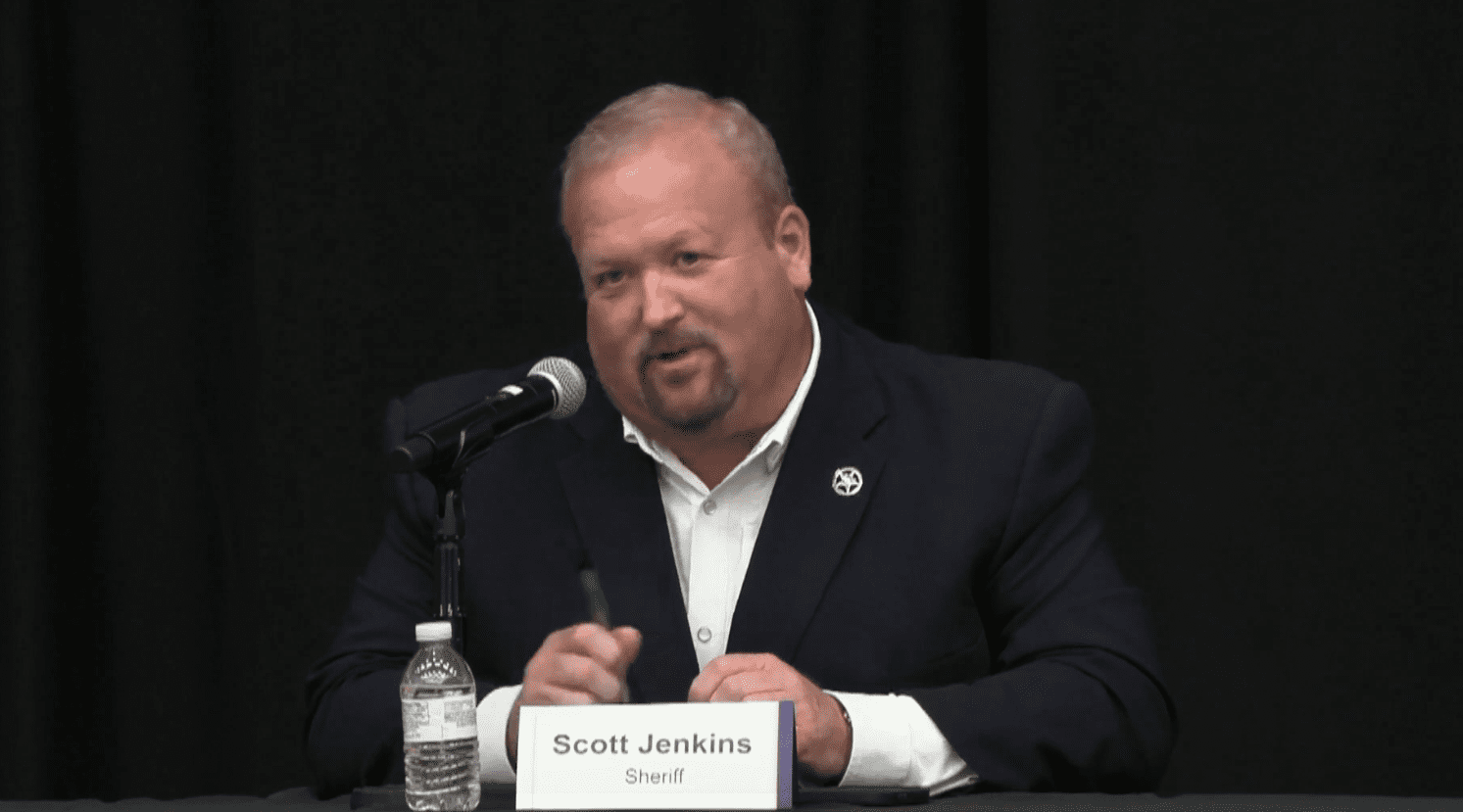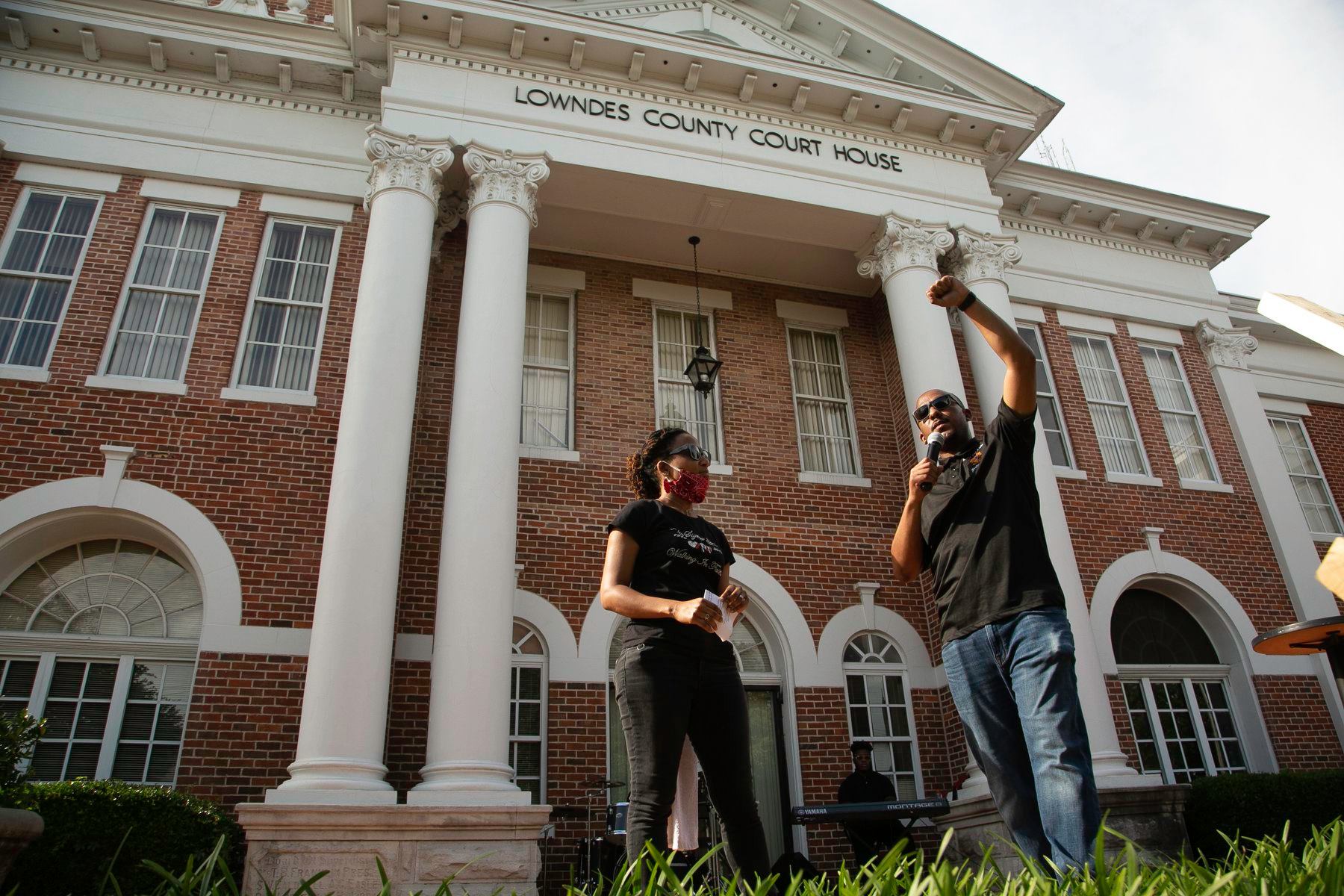Bribery and Fraud Charges Loom Over a MAGA Sheriff Seeking Reelection in Virginia
Scott Jenkins, a so-called constitutional sheriff with deep ties to far-right groups, faces multiple indictments alleging he exchanged favors for campaign contributions.
| October 20, 2023

Editor’s note: Sheriff Scott Jenkins lost to challenger Tim Chilton in the Nov. 7, 2023, election. Jenkins was convicted in 2024, and then pardoned by President Trump in May of 2025.
In the summer of 2019, Scott Jenkins was hunting for cash to fuel his reelection campaign for sheriff of Culpeper County, Virginia, when he texted one of his supporters asking for help. Jenkins, a Republican who hewed hard to the MAGA wing of his party after the rise of Donald Trump, said he was starting to build his “war chest” and needed donations to start rolling in soon. In a text to a supporter identified only as “Individual 1” in federal court records, the sheriff wrote, “Looks like my opponent is hooking up with Democrats to run an attack campaign soon so we’re starting to spend. Let me know if you have luck with anyone.”
The sheriff’s fixer texted back with an update the following month, “I think I got a big fish for you.” The catch, according to court records, was a businessman who lived three counties away named Rick Rahim, whom the text warned had “a little baggage”—namely, previous criminal convictions that prevented him from legally owning firearms. Rahim, the text said, wanted Jenkins’ help to get his gun rights back and also for the sheriff to make him an “auxiliary deputy”—volunteer officers who perform many of the same duties as paid deputies, and in return receive sheriff-issued firearms, body armor, cards declaring them law enforcement officers and even a badge that says “deputy sheriff.”
Federal prosecutors say that Jenkins helped Rahim petition to get his gun rights back and made him an auxiliary deputy in exchange for $6,000 cash and a $17,500 loan. The allegations were part of a 38-page indictment the feds filed against Jenkins this summer, charging the sheriff with accepting more than $70,000 in cash and campaign contributions since 2019 in exchange for making people auxiliary deputies and helping them access guns. In the case of Rahim, who was also charged in the case as well as two other Virginia men, prosecutors allege that Jenkins pressured a local judge to restore his right to firearms and even arranged for the businessman to lease a rural property where the sheriff held fundraisers to make it look like he resided in the county.
Jenkins, who didn’t respond to requests for an interview, is still running in the Nov. 7 election despite facing over a dozen felony counts, including bribery and mail and wire fraud. The U.S. Department of Justice seized $10,000 of his campaign funds, which was nearly all he had, according to campaign finance reports.
Despite calling himself a Republican, Jenkins is technically running as an independent. The local Republican Committee has endorsed one of his opponents, Joseph Watson, a longtime local police officer who was a captain at the sheriff’s office before Jenkins took over; Jenkins didn’t seek the local GOP endorsement this year. Tim Chilton, Jenkins’ other opponent, is another longtime local cop who is running as an independent and has promised to equip all deputies with body cameras and implement policies that he says would modernize the office. Neither Watson or Chilton responded to requests for an interview.
Jenkins seems undeterred despite the looming criminal case against him, which is set to go to trial in May 2024, well after the election. His lawyers started a GoFundMe page to pay for his legal expenses, with donors including Michael Flynn, the disgraced former Trump national security advisor who maintains that the sheriff has been “completely railroaded.”
At a candidate forum put on by the Culpeper Chamber of Commerce in early October, Jenkins stressed his ties to Trump in a county that overwhelmingly voted for him in 2020, while also highlighting his involvement with hard-right sheriffs groups and anti-immigrant advocates at the national level.
“I’m well known as a Republican member since the mid 1990s. I ran independent in my early campaigns, and last time, four years ago, I became your Republican sheriff here in Culpeper, and you know where I stand with that committee locally and what I’ve done on the national scale,” Jenkins said. “I am your Republican sheriff until December. I ran independent in the past and I’m running that way now.”
First elected in 2011, Jenkins quickly made a name for himself as an ultra conservative politician, willing to be involved in a variety of national projects that gave the sheriff a large media platform. He wholly supported Trump’s efforts to restrict immigration. Taking a page from Trump, Jenkins’s old campaign website declares “Make Virginia Great Again” and describes the sheriff as “a recognized thought leader in the areas of Second Amendment rights, secure communities, constitutional government, and law enforcement.”
Jenkins also advanced an anti-immigrant agenda by attending multiple conferences, rallies, and lobbying events sponsored by the Federation for American Immigration Reform, which the Southern Poverty Law Center has designated as an anti-immigrant hate group.
He hired John Guandolo, a disgraced ex-FBI agent who ran xenophobic law enforcement training sessions, to train Culpeper County deputies on “jihadi networks in America.” Even when Virginia refused to give law enforcement training credits for Guandolo’s classes, Jenkins held them anyway. Jenkins made Guandolo an auxiliary deputy despite him also not really living in Culpeper County—which was discovered when emergency responders in Texas pulled Guandolo from his mangled pickup truck after a car crash last October. Guandolo told emergency responders he was a Virginia peace officer, and inside the truck they found a pricey assault rifle that was registered to a sheriff’s office halfway across the country.
In early 2018, Jenkins joined the Immigrations and Customs Enforcement’s 287(g) program, which allows law enforcement agencies to act as immigration agents within their jail. The Culpeper County program is currently the only one in the state of Virginia. Deputies who participate in 287(g) arrangements often question non-white residents for small infractions, like a missing driver’s license or a traffic violation, leading to an arrest and potential deportation proceedings.
While Chilton has not said whether he would move to exit the program, he has expressed concerns about its impact on immigrant communities and promised to re-evaluate it. “It’s the only one in the state of Virginia for a reason so that would lead me to believe it has no benefit,” he told the Culpeper Star-Exponent. “I don’t think local and state people should be enforcing any type of federal law.” Watson has not publicly commented on the sheriff’s involvement in the 287(g) program.
Jenkins is affiliated with many far-right sheriff groups, like Protect America Now and the Sheriffs Fellowship program at the right-wing think tank the Claremont Institute. He is also part of the “constitutional sheriffs” movement, which believes that sheriffs have supreme authority to interpret and enforce the U.S. constitution within their jurisdictions.
Jenkins has sought to bring that doctrine to life by resisting gun control. He said in 2019 that if the Virginia legislature adopted new regulations, he would deputize his entire county to circumvent it. At 2020 Lobby Day, sponsored by the Virginia Citizen Defense League’s (VCDL), a Second Amendment group whose slogan is “Defending Your Right to Defend Yourself,” Jenkins spoke in front of a crowd of 20,000 heavily-armed people.
“As a Virginia sheriff, I know full well the authority vested in all our sheriffs,” he said during the 2020 event. “You the citizens directly elect us to office.” He called sheriffs “the final line that says no encroachment on your Second Amendment rights” and vowed to “deputize thousands of my citizens to see that they’re able to keep their lawful legal firearm.”
Ed Dunphy, political action committee chair of the Culpeper NAACP, says that Jenkins helped continue a tradition of racist politics in the county, which was one of the last in the state to desegregate its schools. In September of 2020, Jenkins posted a message to the official Culpeper Sheriff’s Office Facebook page saying Black Lives Matter activists were “not peaceful and at their heart are violent”; some local Black activists said they didn’t feel safe after his comments.
“That’s the way they run things,” Duphy said. In contrast, Dunphy said Chilton, the independent candidate, has taken a different tone in leadership at the local police department, including fostering positive relationships with local activists who marched after George Floyd’s murder in 2020. Dunphy said Chilton, the only person running for sheriff who attended a recent NAACP candidate forum, seems to embrace community policing and would be “less involved” with ICE. “[He] has realized if victims of crime don’t trust the police, it’s more difficult to solve crime,” Dunphy told Bolts.
Tracey Corder, a consultant for the Local Accountability PAC, which hasn’t endorsed any candidate in the sheriff’s race, also praised Chilton, saying he “has worked to have deep community partnerships, from his work with the NAACP, his advocacy to support families navigating drug addiction and even as a substitute teacher for the Culpeper Technical Education Center.”
Even if Jenkins loses his reelection fight, that may not itself quell the right-wing atmosphere he cultivated as sheriff. Dunphy with the local NAACP pointed to Marshall Keene, a longtime officer at the sheriff’s office who rose to captain under Jenkins, who was also a member of the local school board and chair of the Culpeper County Republican Party, which rented three buses to transport people to Washington, D.C., on January 6. While Keene has since left the sheriff’s office to run security for a neighboring school district, both of Jenkins’s brothers also work in the sheriff’s office, one of them as the county’s chief jailer.
There was no mention of the bribery and fraud charges pending against Jenkins at the chamber of commerce forum earlier this month. According to a local news reports, two dozen deputies were in the audience to support him. Jenkins had also set up a table with “Make Virginia Great Again” t-shirts.
Only Watson, this year’s Republican candidate, made even vague references to the scandals on Jenkins’ watch. He told the crowd that he felt a duty to run for sheriff after “hearing from my neighbors, family and friends about eroding confidence in law enforcement.”
“Like you, I’m concerned about the current situation,” Watson said. “I’m concerned for our county and for our dedicated men and women in the sheriff’s office.”
Stay up-to-date
Support us
Bolts is a non-profit newsroom that relies on donations, and it takes resources to produce this work. If you appreciate our value, become a monthly donor or make a contribution.




